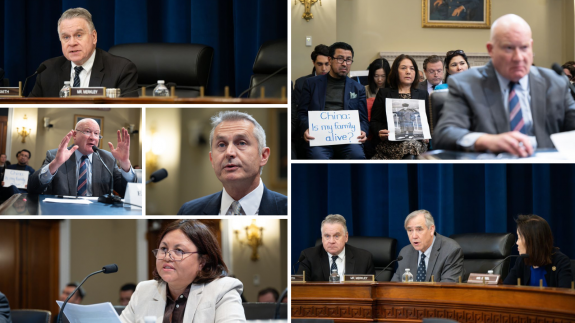Hearing Examines the Crime of Forced Organ Harvesting in China
 |
(Washington)—Representative Chris Smith (R-NJ) and Senator Jeff Merkley (D-OR), the Chair and Co-chair, respectively, of the bipartisan and bicameral Congressional-Executive Commission on China (CECC), held a hearing this week examining the issue of forced organ harvesting in China and how medical associations, businesses, and U.S. state legislatures are grappling with the legal, ethical, and human rights concerns associated with this issue.
At the hearing, titled “Stopping the Crime of Organ Harvesting: What More Must Be Done?” the Commission heard from witnesses who provided new testimony about forced organ harvesting from Uyghurs and other Muslim ethnic minorities in the Xinjiang Uyghur Autonomous Region, Falun Gong practitioners and political prisoners, while assessing the PRC’s denials that it is guilty of transplant abuse. Witnesses also looked at the complicity of the U.S. business and medical and research communities in forced organ harvesting in China and explained how Texas passed its bill restricting the business of organ tourism—which often fuels transplant abuse.
In his opening statement, CECC Chair Smith said, “forced organ harvesting on an industrial scale in China is an atrocity unmatched in its wickedness. The numbers of those executed for their organs—some even before they are brain dead—is staggering…state-sanctioned forced organ harvesting in China amounts to crimes against humanity.”
CECC Co-chair Merkley said in his opening statement that ‘‘In part, this problem can be blamed on Chinese authorities, who make it so difficult to get accurate and trustworthy data…. We need facts to make assessments and formulate policy. We must continue to demand that the Chinese government provide more transparency so that we can assess whether they are meeting international standards. But we must also take care not to let our policy responses be based on circumstantial or outdated evidence.”
Ethan Gutmann, the China Studies Research Fellow at the Victims of Communism Memorial Foundation testified that eyewitnesses described to him the proximity of two large “re-education camps,” the Aksu Infection Hospital, and a large crematorium in the Xinjiang Uyghur Autonomous Region. “It’s a twenty-minute drive to Aksu Airport’s ‘Human Organ Transport Channel’—an export-only fast lane to move human organs east. ‘First Hospital Zhejiang Province,’ as a designated ‘big brother’ to the Aksu Infection Hospital, reports its liver transplants increasing by 90% in 2017, while kidney transplants increased by 200%.”
Matthew Robertson, the China Studies Research Fellow and data scientist at the Victims of Communism Memorial Foundation, provided evidence that PRC officials have falsified claims about transitioning to a voluntary organ donation system in 2015 saying that this fact “is a serious breach of trust that undermines the credibility of China’s claims of reform.” Coupled with “Beijing’s well-documented practices of propaganda and information control around sensitive issues we have every reason to believe that the atrocities continue today…anyone who travels to China for transplant organ could unwittingly cause the murder of an innocent human being and at the same time provide financial gains to an illicit industry that advances Beijing’s goals of eliminating its political enemies.”
Maya Mitalipova, the Director of the Human Stem Cell Laboratory at the Whitehead Institute for Biomedical Research at MIT, addressing corporate complicity, explained in her testimony that “the main reason why the Chinese government invested billions of dollars into DNA sequencing of the entire population of Xinjiang and Tibet [is] because it will make exponentially many more billions of dollars per year in return [in organ transplantation.] Thermo Fisher’s involvement in forced organ harvesting in Xinjiang is undeniable. But while it has vowed to stop selling sequencing machines to the region and to stop providing technical support to maintain them, the company is very successfully selling HLA kits and other custom-made DNA profiling products for organ transplantation, in the ten million range. Thermo Fisher’s Huaxia PCR amplification kit was developed specifically to identify the genotypes of Uyghur, Tibetan, and Hui ethnic minorities. The continued sale of DNA profiling products and technologies by Thermo Fisher to China has to be stopped.”
Tom Oliverson, Texas State Representative and Chair of the Insurance Committee, testified about how Texas bill SB 1040 “attempts to prevent Texans from becoming unknowingly complicit in the act of forced organ harvesting [by] prohibit[ing] health benefit plan issuers from covering human organ transplants that are performed in China or in another country known to participate in forced organ harvesting.” He noted that SB 1040 became a model for other state assemblies. Similar bills have passed the Arizona House and the Utah Senate, and Missouri, Idaho, and Illinois were all in the process of passing legislation like S 1040.
Both Chairs urged passage of the Stop Forced Organ Harvesting Act in the Senate. The House passed the bill in March 2023 by an overwhelming 412-2 vote. Chairman Smith said the “landmark and bipartisan legislation” includes annual State Department reporting and sanctions for those engaged in illegal organ trafficking globally and noted that the legislation is the “strongest legislation ever introduced by any country to combat the grotesque atrocity of illegal organ harvesting.”
Opening statements by the Chairs, witness statements, and other statements submitted for the record, and an archived hearing video, can be accessed on the CECC’s hearing webpage.




